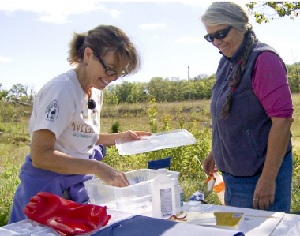CLARKE– Clarke County’s Spout Run watershed has the potential to provide clean water and support a large variety of wildlife species. Yet, the stream is on the State Impaired Waters List due to nutrient and sediment levels from fertilizers, livestock and other human-related activities. This is bad news not only for the wildlife and people living around the watershed, but also for communities downstream—including the Chesapeake Bay.
Clarke County
Clarke County has a time-honored tradition of promoting and protecting its agricultural roots. It was one of the first counties in the nation to adopt protective zoning regulations, and continues to conserve its unique heritage.
C Spout Run
There are some exciting initiatives coming up in Clarke County to improve the Spout Run Watershed. One of those is a citizen stream monitoring program – a fun opportunity for you to get involved in a very hands-on way.
Spout Run Watershed Gets Some T.L.C.
Clarke County’s Spout Run watershed is comprised of 14 miles of perennial streams, many of which are spring-fed. So, Spout Run has the potential to provide clean water and support a large variety of wildlife species. Yet, the streams are considered unhealthy due to the levels of nutrients and sediment from fertilizers, livestock, and other human-related activities. For this reason, the Spout Run watershed is on Virginia’s State Impaired Waters List. This is bad news not only for the wildlife and people living around the watershed, but also for those downstream—including the Chesapeake Bay.

Support Nature & History, Support the Cool Spring Battlefield Park
Update: Today, March 5th, the Board of Supervisors voted to reject the park proposal in a 3 to 2 vote. To read more about thier decision see the Clarke Daily News article available online.
Cows, Not Condos
Bev McKay's family has been farming the land that he just protected in Clarke County for over 200 years. Mr. McKay raises dairy cattle on the property, as well as crops, such as corn and barley, to feed the cows.
The land is good for farming, with gently rolling fields and rich loam soils. Because of its value as productive farmland, the USDA and PEC worked together to purchase an easement on 103 acres, over half of which are prime agricultural soils.

